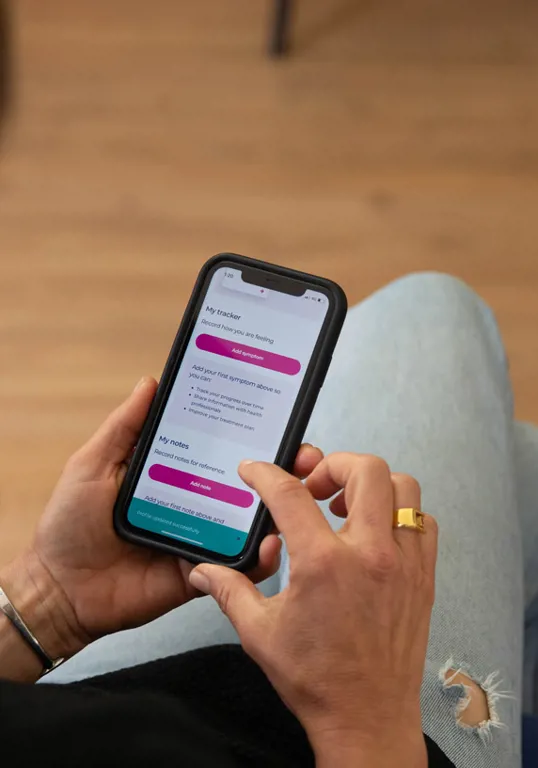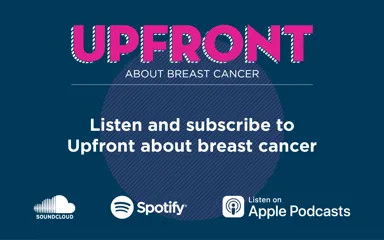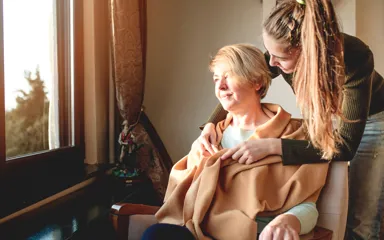Kellie Curtain [00:00:36] Let's be upfront about advance care planning and breast cancer. Living with breast cancer often means you need to make decisions about your treatment and care, as well as working with your treating team to work out decisions surrounding your current care. It's also good to think ahead and talk about the care you may want in the future. If you were to become seriously ill and unable to communicate your preferences or make decisions regarding your care. Advance care planning allows you to think about and document your preferences for future health care and can often provide a sense of relief to allow you to focus on living life fully in the present. Joining us for this episode of Upfront is Dr. Sonia Fullerton. Sonia is a consultant in palliative medicine who assists in patient centred decisions, making and advance care plans. This episode of Upfront About Breast Cancer is an unscripted conversation. The topics discussed are not intended to replace medical advice, nor necessarily represent the full spectrum of experience or clinical option. So please exercise self-care when listening to this podcast, as the content may be triggering or upsetting for some. Hello, Sonia, and welcome.
Dr Sonia Fullerton [00:01:48] Thank you very much. Great to be here.
Kellie Curtain [00:01:50] So tell us what is advance care planning?
Dr Sonia Fullerton [00:01:54] Advance care planning is a lot simpler than people make out. Advance care planning is the process for discussing and documenting your health care wishes and values and priorities in case there's a time in the future where you're not able to communicate those wishes and values so often.
Kellie Curtain [00:02:11] If you bought up advance care planning when you're healthy and in an everyday sort of setting, it wouldn't be confronting. But I imagine if it coincides with a breast cancer diagnosis or a metastatic breast cancer diagnosis, there can be a lot of fear that means things are not going well.
Dr Sonia Fullerton [00:02:31] Yes, that's right. And I want to demystify that a little bit today. That happens quite often in my working life because I'm also a palliative care doctor. And sometimes when I start talking to people about advance care planning, they get upset and they think that I'm meaning to tell them that the end of their life is approaching quickly, but it's not the case at all. Advance care planning is the process of thinking about who would speak for you and what would they say if you were so unwell that you couldn't talk to the doctors and nurses about the care you wanted or the care that you didn't want.
Kellie Curtain [00:03:03] So this, I imagine, might not necessarily be a permanent case of not being able to express your wishes. It might be a decision that needs to be made while you're in surgery.
Dr Sonia Fullerton [00:03:15] Absolutely. Here's a great example. There's not many good things that came out of COVID, but COVID's given me a great example, say you have a very unwell and you went to the emergency department and the doctors wanted to ask you what sort of treatment that you wanted or treatment that you didn't want, but you were so sick he couldn't talk to them about it. The advance care planning is the process by which you let everyone know who should make medical decisions for you, who would be representing your best wishes in that situation where you couldn't make those decisions yourself?
Kellie Curtain [00:03:45] Is that a medical power of attorney?
Dr Sonia Fullerton [00:03:47] Such a good question. So this is a complicated answer because we're broadcasting today to many different states in Australia, and each state has different laws about who this is. The old term in Victoria was medical power of attorney. The term that we use now in Victoria is medical treatment decision maker, but different states use different terms. So it might be the enduring guardian. Enduring power of attorney substitute, decision maker. They all mean the same thing. It's the person that would make medical decisions for you if you were incapacitated for any reason.
Kellie Curtain [00:04:21] Okay, so we're talking about nominating a person or persons who quite often would be a family member, but not necessarily. Yes. Is it someone that you have to like or someone you share similar values with, or someone who can just follow directions?
Dr Sonia Fullerton [00:04:39] I think that last point is the most important one. So ideally it's someone who's confident who would be able to speak up and express your wishes. You want that person to really understand that when they're being asked to make a decision, that person's not being asked about their own views. They are being asked about your views, the patient's views about what treatment they wanted or didn't wanted. Ideally, it would be someone who's available to make that decision, but of course, they could be available on the phone or on Skype, so that's not necessary.
Kellie Curtain [00:05:12] So how do you go about filling out an advance care plan?
Dr Sonia Fullerton [00:05:16] It is two bits to it to think about who would speak for you if you were unwell and what would they say? Thinking about the first bit? First, who would speak for you in the law? There's a list of people that the doctors would go to ask. So for example, it might be an appointed legal guardian or your spouse or your siblings, et cetera. If you want someone in particular that's not on that list, then you need to appoint them as your medical treatment decision maker or enduring guardian, whichever terms used in your state. So that's the first thing to think about who you would like to appoint. The second thing is about what they would say, and advance care planning can involve formal legal documents that you have to get signed and witnessed, et cetera. Or it can be as simple as having a conversation over Christmas. You know what happened to Auntie Gladys? She went into a nursing home. She lost all marbles. She couldn't talk to anyone. She hated it. I would never want that to happen to me. That's the sort of conversation that you might have over the dinner table at Christmas. And when your friends and family know what your wishes are, then they can represent those wishes if they ever need to.
Kellie Curtain [00:06:29] I know we're talking about this largely in a breast cancer context, but the fact is, even if you do have breast cancer, advanced breast cancer, metastatic, no matter who you are, things can happen unexpectedly. Even with a breast cancer diagnosis, something else can happen where all of a sudden you cannot verbalise, your wishes.
Dr Sonia Fullerton [00:06:50] That's right. So metastatic breast cancer is one of the tricky things about it. People can live so well for such a long time, and then suddenly something unexpected can happen that can interfere with your ability to make decisions for yourself. So I can think of two examples that are common in metastatic breast cancer. One is that sometimes some of the cancer metastasises to the brain, and that can temporarily interfere with your decision-making capacity. Secondly, sometimes people can run into trouble with high calcium in their blood, which can also cause a temporary confusion or delirium state. That means that you're not able to make your own medical decisions. So there are two quite common scenarios in which we would expect the person to then with treatment go on to improve their decision making status afterwards. What you want is to have someone chosen who will represent your wishes and express to the doctors whether you'd like treatment or you wouldn't like treatment, or what sort of treatment would be in line with your preferences and values so that you retain power over what happens if you become unwell and lose your ability to make or communicate decisions.
Kellie Curtain [00:07:58] So when appointing that person, as we've just touched on it, the immediate thought might be a family member. If you do get to a scenario where you are unable to verbalise, that's likely to be a very emotionally charged situation. So that's possibly another thought that the emotions might get in the way of carrying out your wishes.
Dr Sonia Fullerton [00:08:21] Yes. And when I'm going through these appointments with the patient and with their selected medical treatment decision maker, I always talk about that, that I make sure that the person who's appointed is aware that we're asking for the views of the patient, not for their own views. Sometimes in the heat of the moment when people are really upset, they might say things like, I know mum wouldn't want this treatment, but I can't bear to let her go. But I always bring it back to the wishes of the person. That's the most important thing in delivering that care.
Kellie Curtain [00:08:52] Okay, so whether you're talking about a conversation or writing it down or making it formal as far as downloading the form off the advance care planning website, how much detail should someone go into when talking about an advance care plan?
Dr Sonia Fullerton [00:09:07] Great question. Previously, I think we put a lot of emphasis on refusing or accepting certain treatments, things like I don't want cardiopulmonary resuscitation or I don't want dialysis or I do want life prolonging treatments. But what we're trying to move towards is the way to really respect someone's values and preferences. So sometimes when I'm talking to people, I talk to them about me because that's easier for me. My cognition, my brainpower is really important. I love being on the internet, talking to people, communicating with my children. I'm not much of a sports person. And so if I lost the ability to walk, for example, that would not necessarily be be something that wouldn't make my life worth living. However, if I lost my cognition permanently and I wasn't able to communicate with people or read a book or go on the internet, that would be something that meant that my life probably wouldn't be worth living at. Every single person is different. A professional sports person would possibly have a different point of view. So we like to ask the person about their preferences and values. What's important to them.
Kellie Curtain [00:10:18] A conversation like that seems less confronting too, rather than sitting there saying, how do you feel about life support? How do you feel about amputation? How do you feel about losing your sight or your hearing or being incapacitated? Vs. what do you what do you love most about your life, is it being in the garden? Is it being being able to watch television?
Dr Sonia Fullerton [00:10:44] Yes, or for some people, their beloved pet is the most important thing for them. So in that setting, when I was thinking about planning someone's future care, perhaps I would be offering them at admission to hospital where their pet couldn't come to see them. So if someone's expressed to me that their dog is so important in their life and that's the their main joy in life, then I would try to look for solutions that would enable that to keep happening.
Kellie Curtain [00:11:07] Okay, so we have the difference between making something formal and legal and just having a conversation. Do they both, well, I can't both carry the same weight, that they must both have their value.
Dr Sonia Fullerton [00:11:20] Absolutely. In Victoria, there are two types of advanced directives, a values directive, which is what I've just been talking about. I love taking my dog for walks. I want to be independent. I would hate to be so unwell that people would have to shower me or whipe my bottom. And then there's an instructional directive which is much more specific. I do not want cardiopulmonary resuscitation. I do not want to have dialysis. When I'm talking with people, I try to steer them more towards the values directive. The disadvantage and the advantage of the Values Directive is that we must take it into consideration, but it's not binding. An instructional directive is binding on the doctor. So it's a very powerful instrument. So if you write an instructional directive that says I do not want cardiopulmonary resuscitation, I don't want you jumping on my chest and breaking my ribs. I may not give cardiopulmonary resuscitation to that person. It's a very powerful instrument. And so when I'm talking with people, I often try to steer them more towards statements of their values so that there's some flexibility.
Kellie Curtain [00:13:03] How often should you update an advance care plan?
Dr Sonia Fullerton [00:13:06] Depends a little on whether your health condition is changing. But I think that we find that people's values and preferences remain relatively stable through time. So I'm the sort of person who would say if I were dying of cancer, for example, I would not want to have life prolonging treatments if my quality of life was poor. I say that as a person who doesn't have cancer, I'm certain that if I did have cancer, my views and my preferences would be similar. If you write a very explicit thing like about cardiopulmonary resuscitation or something in an instructional directive, that sort of wish might change over time
Kellie Curtain [00:13:46] If it's written down, say, in a diary or notebook.
Dr Sonia Fullerton [00:13:48] Yes.
Kellie Curtain [00:13:50] Is that still binding?
Dr Sonia Fullerton [00:13:51] No, it has to be on the appropriate form. A medical practitioner has to verify that you've got that. You understand what you're signing, what you're writing down. It's quite a a strict criteria. But if you wrote in your diary a diary note about what did or didn't want, then that would be a values directive, and it's something that I must take into consideration.
Kellie Curtain [00:14:13] To that end, it's great to write all these down, and it's great to have these discussions. But if something happens quickly, how do we know where to find it?
Dr Sonia Fullerton [00:14:23] That is such a great question. Can I tell you a funny story?
Kellie Curtain [00:14:26] Please do.
Dr Sonia Fullerton [00:14:28] There was a lady who was being looked after by the community palliative care team and often the community palliative care team would tell the patients, put your advance directive on the fridge. So with a fridge magnet on the fridge, she'd misheard the instructions and she kept it in the fridge. And a number of different people told her, no, you can't keep it in the fridge. The ambulance officers will not be coming in looking in your fridge. But she was adamant palliative care told her, put it in her fridge and that's where it stayed. It was very cold, but not very visible.
Kellie Curtain [00:14:58] So they found it, though.
Dr Sonia Fullerton [00:15:02] No, I don't think so. I think the key is communication about your wishes. So I hope that everyone listening to this podcast, if they think that advance care planning is something that they might do, will jump on the Advance Care Planning Australia website, have a look at some of those forms. If you fill them out. Here's the important thing. Make a bunch of copies. Upload one to my health record. Give one to your general practitioner and send another one to your local health service. So your local hospital, the place that you would go if you are unwell and they'll pop it in their records and then, if you unluckily, turn up to aid it on Saturday night at 3:00 in the morning, they will have those documents. They're available for you because almost people never remember, because they're confused, they're unwell. They're upset. It's an upsetting situation. They don't remember to take their forms with them.
Kellie Curtain [00:15:51] How we could assist you in starting that process, it sounds a little bit daunting to upload. And also, do you have to fill out all the questions in a directive? Can you just select what's really important to you?
Dr Sonia Fullerton [00:16:05] Absoluetly. You can select what's important to you. Your general practitioner can assist you. If I were doing one, I think I would print out some forms, have a preliminary discussion with my family members, and then go along to my general practitioner to ask if they can assist you with signing those forms to upload them to the my health record. It does take a small bit of technical expertise, so you might need to get a friend or a relative just to help you upload that PDF. And you might also need access to a photocopy just to make a bunch of copies and distribute them
Kellie Curtain [00:16:39] Do many people do advance care plans?
Dr Sonia Fullerton [00:16:41] So, no, not as many people as they should. The thing that makes me sad is that a number of people do do them, and the statistics, according to the research, studies vary over which setting you're in. But many people have done some sort of advance care planning, but it hasn't made it into the hospital records to that place where at the point of care, the doctor looking after you is going to see it.
Kellie Curtain [00:17:06] So if you don't have an advanced care plan, and you don't happen to have anyone around that knows what your wishes are, or in fact, you might have two people that have differing opinions. What happens?
Dr Sonia Fullerton [00:17:26] Oh, so that's a very common situation. Unfortunately, when someone comes into the emergency department, for example, we would do an assessment of their medical situation and then we will identify who the correct person is to be able to make decisions on your behalf if you're not able to. I should also say that, of course, if you are able to make your own decisions, we will always ask you if you're not able to make your own decisions, we run through the hierarchy of who is the right person to make those decisions. Sometimes when that happens, we turn to that person. It might be the elderly husband or the elderly, wife and we ask, Oh, what did your husband say about the sorts of treatments he wanted or he didn't want? What do you think he would want us to do now? Very commonly, the person looks back at us and says, I don't know. We never discussed it. I wish we had, but we never discussed it. Now, I'm not sure what they would want. Then we have to together work with the substitute decision maker to try and make the best decision. The most appropriate decision, we think, would be the right one to make for that person. But it doesn't have the direct input of the patient who is unwell.
Kellie Curtain [00:18:37] Yeah, quite often people don't want to talk about it because despite the fact that death may not be imminent, it's still associated with end of life. Yes, and sometimes people think, Well, I'm not going to be here. They can make those decisions. I don't care. It's a very big burden to leave with someone you love, isn't it?
Dr Sonia Fullerton [00:18:59] It is. And research studies have shown that advance care planning actually reduces anxiety and depression after the patient dies in the surviving relatives. Sometimes people talk to me and say, Oh, look, I don't want to do it. I don't see why it would benefit me. You'll just make the decision. I won't know anything about it. But actually, if we do go through this process, it relieves that burden of making that decision on your friends and family because they know that they've upheld your wishes and they feel less guilty afterwards.
Kellie Curtain [00:19:32] And also not guilty about having possibly made the wrong choice.
Dr Sonia Fullerton [00:19:36] That's right, because they know what the right choice was. Because you told them over Christmas dinner, you said, don't let this happen to me. This is what I want in this situation.
Kellie Curtain [00:19:45] So it's not just about you. It's actually about those you love as well.
Dr Sonia Fullerton [00:19:48] Absolutely. Because some of the treatments that we can give, we are not always certain that it's the right thing to do. So say someone with very advanced breast cancer was very unwell. There are some treatments that we could give to try to turn the situation around. Sometimes those treatments are very burdensome for the patient. And if the patient desperately wanted to try those treatments, of course, we would go through that process of discussing the the pros and cons of those treatments. But if the person going back to my dog story, for example, if the person really wanted to be at home with their dog, then we can direct the person's care down a different road. It's a way of the patient retaining control over the medical decisions being made about them, even if they're unwell and not able to participate at the time.
Kellie Curtain [00:20:40] If you have filled out an advance care plan, can you change it?
Dr Sonia Fullerton [00:20:43] Absolutely. Yes, you can change it
Kellie Curtain [00:20:45] at any time and is it easy to change? Or do you have to go through the whole process?
Dr Sonia Fullerton [00:20:49] You just have to. You have to go through the whole process again. Yes.
Kellie Curtain [00:20:51] OK, so what about end of life? That is part of advance care planning? It's not the whole part of it, yes, but you have a beginning of life and you have an end of life.
Dr Sonia Fullerton [00:21:01] And I love talking about end of life care because I'm a palliative care doctor, but I just want to say again to get it off my chest. That advance care planning is not just about end of life care, but of course, when someone is very unwell and their conditions deteriorating, they may have run through a number of different lines of treatment for their metastatic breast cancer. They may be getting to a situation where there were few lines of treatment that that they could have in the future. I think it's a terrific idea to think about this sort of thing. We know that the majority of Australians want to die at home, but actually only 15% of Australians manage to die at home. If a medical situation is getting worse, it's a great idea just to think about the sort of care that you would want in the sort of care that you wouldn't want, where you would like to be. What sort of treatment you might like or not like. Discuss that with your friends and family. If you want to put it in an advanced directive. That's fantastic as well, because palliative care services are available in the community to help look after you at home. Most of the time, you might not need to go into hospital as much or at all, in fact.
Kellie Curtain [00:22:05] And a reminder also that this is in a situation where you are unable to verbalise
Dr Sonia Fullerton [00:22:11] yes, advance care plans only are enacted when a person either can't verbalise or their brain is not working well. They have a delirium, so they can't be involved in those decisions. If you are well enough to be able to understand medical decisions and communicate them to everyone, then advance care planning does not come into play. We will always ask you what your wishes are
Kellie Curtain [00:22:36] pointing to the research about less anxiety for those that have to make those decisions. If there's an advance care plan, is there some evidence to show that someone who has filled out an advance care plan leads a better quality of life?
Dr Sonia Fullerton [00:22:53] There it is. So we know that people who've engaged in the process of advance care planning they spend less time in hospital, they have less futile intervention, so a futile intervention in someone who's dying might be going to intensive care or having CPR. We know that people who've gone through the process of advance care planning can avoid those types of treatments that may not add value to their care and add value to their life.
Kellie Curtain [00:23:18] Well, thank you, Sonia. It's a really important conversation. Like you said, it can be quite beautiful a conversation where you can really get to know someone even that you thought you knew really well. There's always something to learn about what they might like and what they might not want in relation to their values and how they want to live their life.
Dr Sonia Fullerton [00:23:40] Absolutely. Yes, it's really valuable. It's like gold, having had a patient who's had this conversation with their family. So even if I can't talk to them directly about what they want, I can gather their wishes and values from their friends and family and make sure they get the care that they want and that they don't get the care that they don't want.
Kellie Curtain [00:24:00] And as a palliative care doctor, what is your greatest joy or privilege in being involved in the care of someone who has advanced illness and is able to carry out their wishes, either in the in the short term or at the end of life?
Dr Sonia Fullerton [00:24:16] A fun thing in my day is when the patient says to me, I've had enough of being in hospital, I want to get home and my team and I pull out all the stops and often we can get them home that same day or if not the next day, and we can provide community palliative care services and the equipment that they need to be at home. I think that's the thing that's really fun for me. It takes a lot of teamwork and communication,
Kellie Curtain [00:24:40] and I'm sure you'd really like to work to help take the fear out of this
Dr Sonia Fullerton [00:24:45] Absolutely, yes. I think that people can be very frightened, and I say that when I start an advance care planning conversation, people are frightened and they think it means that I'm telling them that they're about to die. It's not at all the case. I just want them to be able to communicate their views, express their views and have some control over what treatments that they get if they ever were to become confused and not able to say for themselves.
Kellie Curtain [00:25:12] And again, the best place to find all you need to know about an advance care plan.
Dr Sonia Fullerton [00:25:17] It is advanecareplanning.org.au. That's the Advance Care Planning Australia site, and they have different pages for each state. So if you live in Queensland, you can go into the Queensland state and get the documents that are appropriate for your jurisdiction.
Kellie Curtain [00:25:33] Thank you to Dr Sonya Fullerton for joining us and this podcast was brought to you with thanks to Dry July. BCNA My journey has a range of resources about planning ahead, when you have metastatic breast cancer, sign up and visit myjourney.org.au. Don't forget, BCNA's Online Network is also an online peer to peer support community where you can connect with others going through a similar experience. To join, visit the BCNA website. Subscribe to ensure you never miss an episode of upfront and download, so you always have an episode ready to listen. Leave a rating and review and tell us what you liked about the episode and complete the survey that you'll find in the show notes. This survey will help us to tailor and create content that's relevant to your breast cancer diagnosis. Thanks for joining us. I'm Kellie Curtin. It's good to be upfront with you.











![[blank]](https://bcna-dxp.azureedge.net/media/en2fczb2/bcna_placeholder_bg.jpg?rxy=0.7593219354887106,0.2881619937694704&width=384&height=240&format=webp&quality=80&rnd=133546802863430000)





![[blank]](https://bcna-dxp.azureedge.net/media/en2fczb2/bcna_placeholder_bg.jpg?rxy=0.7593219354887106,0.2881619937694704&width=64&height=64&format=webp&quality=80&rnd=133546802863430000)

Listen on